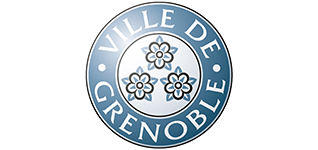City of Grenoble

Grenoble is a city in southeastern France, at the foot of the French Alps where the river Drac joins the Isère. Located in the Auvergne-Rhône-Alpes region, Grenoble is the capital of the department of Isère and is an important European scientific centre. The city advertises itself as the “Capital of the Alps”, due to its size and its proximity to the mountains.
Grenoble’s history goes back over 2,000 years, to a time when it was a small Gallic village. It gained somewhat in stature by becoming the capital of the Dauphiné in the 11th century, but Grenoble remained for most of its history a modest parliamentary and garrison city on the borders of the kingdom of France.
Industrial development increased the prominence of Grenoble through several periods of economic expansion over the last three centuries. This started with a booming glove industry in the 18th and 19th centuries, continued with the development of a strong hydropower industry in the late 19th to early 20th centuries, and ended with a post-World War II economic boom symbolized by the holding of the X Olympic Winter Games in 1968. The city has grown to be one of Europe’s most important research, technology, and innovation centers, with each fifth inhabitant working directly in these domains.
The population of the city (commune) of Grenoble was 158,180 at the 2016 census, while the population of the Grenoble metropolitan area (French: aire urbaine de Grenoble or “agglomération grenobloise”) was 687,985. The residents of the city are called “Grenoblois”.
The Bouchayer-Viallet site is a powerful symbol of Grenoble’s industrial past. This former factory is now converted into a dual-purpose area more closely linked to the Berriat neighbourhood. Innovative business activities as Apple Inc. co-exist with housing, sporting facilities, contemporary music venue and arts centres as Le Magasin. At the entrance to the Bouchayer-Viallet site, Square des Fusillés has been redeveloped and extended taking over an old car park, to facilitate access from the tramway stop and Cours Berriat.
Redevelopment of the former De Bonne barracks was an important step in the drive to launch sustainable housing in France. In 2009, the site of De Bonne was distinguished as the best eco-neighborhood in France. A shopping mall contains 53 shops arranged around an inner concourse, with one side opening onto the park and the other connecting to the town.
Grenoble is one of the co-location centres of the European Institute of Innovation and Technology’s Knowledge and Innovation Communities for sustainable energy.
From 2014 to 2017, the city of Grenoble tested the rental of seventy I-Road electric vehicles.
In 2016, the speed limit was lowered to 30 km/h (18.6 mph) in 80% of the streets of Grenoble and forty-two neighboring municipalities, to both improve safety and reduce pollution levels,. The limit however remains 50 km/h on the main arteries.
Source : Wikipedia
 France
France